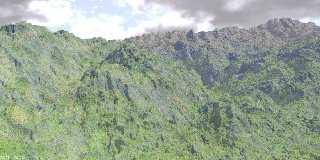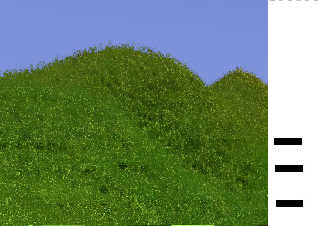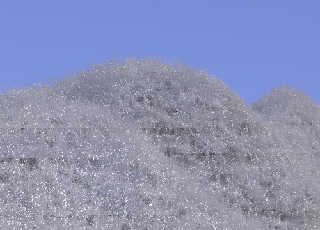 |
 |
|
 |
|
 |
|  |
|  |
|
 |
|
 |
|  |
|  |
|
 |
I was browsing some time ago through Christoph Hormann's site, when my
attention was caught by this:
http://www.imagico.de/pov/asia/making.php
Lo! Using splines in isosurfaces! Something I had never done before. So,
I started testing and soon discovered that (1) Christoph's explanation
was not complete (how do you /really/ add curves to the road?) and (2)
using splines in isosurfaces was not really a trivial matter to get right.
On my way, I got the attached landscape where a spline controls the
ravine cutting the landscape from the lower right hand corner to the
upper left.
Rendering is slow, even with a far from optimal max_gradient, so the
render was restarted using +C a couple of times. Total render time was
about six to seven hours.
What puzzles me in the resulting image here is the visible boundary
between the first partial render and the first restart at about one
third down the image. You cannot miss it. I never experienced something
like that before. From a couple of experiments, I guess that it has to
do with the isosurface but I am at a loss about /why/. Any idea?
Using version 3.8 (also shows with 3.7 as far as I can tell), 6 threads,
on a i5 laptop.
--
Thomas
Post a reply to this message
Attachments:
Download 'into the wild_07.jpg' (164 KB)
Preview of image 'into the wild_07.jpg'

|
 |
|  |
|  |
|
 |
|
 |
|  |
|  |
|
 |
Wow, the things you can do with Povray! I also like the last line in his article
of the mountains: Rendering took 12 days, and you complain about six hours!
It is too bad there is no example source file, it looks rather complicated, but
looks good.
Cheers
Ton.
Post a reply to this message
|
 |
|  |
|  |
|
 |
|
 |
|  |
|  |
|
 |
Op 12/08/2020 om 01:51 schreef Ton:
> Wow, the things you can do with Povray! I also like the last line in his article
> of the mountains: Rendering took 12 days, and you complain about six hours!
> It is too bad there is no example source file, it looks rather complicated, but
> looks good.
>
LOL! I am not complaining: I know what to expect with isosurfaces. I am
worried though, about that +c matter.
--
Thomas
Post a reply to this message
|
 |
|  |
|  |
|
 |
|
 |
|  |
|  |
|
 |
What you could try to do is render the whole scene non-stop with +ec0.25, so it
doesn't take so long, and see whether that difference still shows up. That way
you are sure it is the +c.
Cheers
Ton.
Post a reply to this message
|
 |
|  |
|  |
|
 |
|
 |
|  |
|  |
|
 |
On 8/11/20 4:52 AM, Thomas de Groot wrote:
...
>
> What puzzles me in the resulting image here is the visible boundary
> between the first partial render and the first restart at about one
> third down the image. You cannot miss it. I never experienced something
> like that before. From a couple of experiments, I guess that it has to
> do with the isosurface but I am at a loss about /why/. Any idea?
>
> Using version 3.8 (also shows with 3.7 as far as I can tell), 6 threads,
> on a i5 laptop.
>
Interesting. Not sure.
While you were experimenting with continuations, did the discontinuity
at the continuation move around substantially enough to be sure it's not
related to camera rays and slope in some fashion? Guessing you are using
a slope based pattern?
There are what I think of as 2.5 bugs in the shadow cache mechanism of
v37 and v38 which are fixed in povr. And with povr, users can set the
shadow tolerance which is in play with the bugs too. These bugs /
limitations have the potential to behave differently depending upon the
objects in play and so too isosurfaces over other objects. The shadow
cache state wouldn't be carried through on a continuation so 'suppose'
those 2.5 shadow cache bugs could be the cause.
There is too an isosurface/thread based cache mechanism specific to the
isosurface, but looking at the code doubt it could cause the discontinuity.
I don't really have the machine for this scene..., but is the scene
small enough you could package it up - without the cloud media if
possible? Maybe, if I render vertical slices or something I could
reproduce it in v38, then try a similar continuation with povr without
tying my machine up too long.
Bill P.
Post a reply to this message
|
 |
|  |
|  |
|
 |
|
 |
|  |
|  |
|
 |
Op 12/08/2020 om 16:41 schreef William F Pokorny:
> Interesting. Not sure.
I am even less sure now to tell the truth. Rendering again a vertical
slice covering the upper right area where the effect was most visible, I
could not recreate the effect! I am continuing to do a couple of tests
today, but I wonder now if this is not a clear sign of the Jekyll/Hyde
Syndrome ;-) I /may/ have made a slight change, in particular to the
haze media code I use, between render sessions... Only I do not remember
having done that at all. You could even hold a gun to my head and I
would say the same ;-)
>
> While you were experimenting with continuations, did the discontinuity
> at the continuation move around substantially enough to be sure it's not
> related to camera rays and slope in some fashion? Guessing you are using
> a slope based pattern?
In a slightly different setting (of which I shall talk later) the
discontinuity moved with the location where I interrupted/restarted the
render. That seemed clearly to be related to the isosurface somehow.
>
> There are what I think of as 2.5 bugs in the shadow cache mechanism of
> v37 and v38 which are fixed in povr. And with povr, users can set the
> shadow tolerance which is in play with the bugs too. These bugs /
> limitations have the potential to behave differently depending upon the
> objects in play and so too isosurfaces over other objects. The shadow
> cache state wouldn't be carried through on a continuation so 'suppose'
> those 2.5 shadow cache bugs could be the cause.
>
> There is too an isosurface/thread based cache mechanism specific to the
> isosurface, but looking at the code doubt it could cause the discontinuity.
>
> I don't really have the machine for this scene..., but is the scene
> small enough you could package it up - without the cloud media if
> possible? Maybe, if I render vertical slices or something I could
> reproduce it in v38, then try a similar continuation with povr without
> tying my machine up too long.
>
Thanks, I shall do that if my own suspicions are cleared away. The scene
is not large at all. I shall report back.
--
Thomas
Post a reply to this message
|
 |
|  |
|  |
|
 |
|
 |
|  |
|  |
|
 |
Op 12/08/2020 om 09:39 schreef Ton:
> What you could try to do is render the whole scene non-stop with +ec0.25, so it
> doesn't take so long, and see whether that difference still shows up. That way
> you are sure it is the +c.
>
Yes, I was going to do that indeed. See also my answer to Bill.
--
Thomas
Post a reply to this message
|
 |
|  |
|  |
|
 |
|
 |
|  |
|  |
|
 |
This is the other issue I mentioned above. Here the isosurface simulates
vegetation. At the bars'levels, I stopped the render and restarted with
+c. A boundary is visible from the exact point of start onwards.
No media used here; just the isosurface.
The green image with a complex slope texture.
The grey image with a simple pigment. I restarted three times there too;
can you see them? ;-)
--
Thomas
Post a reply to this message
Attachments:
Download 'continueissue.jpg' (87 KB)
Download 'continueissue_grey.jpg' (62 KB)
Preview of image 'continueissue.jpg'

Preview of image 'continueissue_grey.jpg'

|
 |
|  |
|  |
|
 |
|
 |
|  |
|  |
|
 |
On 8/13/20 3:59 AM, Thomas de Groot wrote:
> This is the other issue I mentioned above. Here the isosurface simulates
> vegetation. At the bars'levels, I stopped the render and restarted with
> +c. A boundary is visible from the exact point of start onwards.
>
> No media used here; just the isosurface.
>
> The green image with a complex slope texture.
> The grey image with a simple pigment. I restarted three times there too;
> can you see them? ;-)
>
I do indeed. Aside from the continuity on continuations issue those
results look pretty good for quick vegetation, frosted vegetation. :-)
I await the test scene.
Bill P.
Post a reply to this message
|
 |
|  |
|  |
|
 |
|
 |
|  |
|  |
|
 |
Op 13/08/2020 om 13:47 schreef William F Pokorny:
> On 8/13/20 3:59 AM, Thomas de Groot wrote:
>> This is the other issue I mentioned above. Here the isosurface
>> simulates vegetation. At the bars'levels, I stopped the render and
>> restarted with +c. A boundary is visible from the exact point of start
>> onwards.
>>
>> No media used here; just the isosurface.
>>
>> The green image with a complex slope texture.
>> The grey image with a simple pigment. I restarted three times there
>> too; can you see them? ;-)
>>
> I do indeed. Aside from the continuity on continuations issue those
> results look pretty good for quick vegetation, frosted vegetation. :-)
My original image seems to be definitely due to an uncontrolled change
to the code by me. I was misled by this present issue apparently.
Yes, this makes up for an interesting vegetation indeed. However, it is
not fast of course.
>
> I await the test scene.
Posted the scene in p.t.scene-files.
--
Thomas
Post a reply to this message
|
 |
|  |
|  |
|
 |
|
 |
|  |




![]()